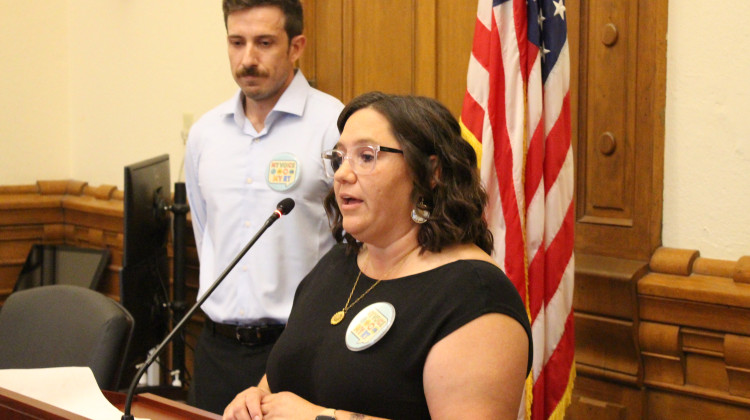
Recreation therapists Tyler Neimeyer (left) and Lori Schweyer discuss their opposition to Indiana’s proposed Medicaid waiver changes at the Indiana Statehouse on Friday, Aug. 15, 2025.
Ben Thorp / WFYIPeople with disabilities could face significant cuts to therapy services if Indiana’s proposed changes to Medicaid waivers are approved.
Lawmakers and advocates gathered at the statehouse on Friday to oppose the reductions. The state could submit a request to the federal government as early as next month.
The state is proposing changes that would cap music and recreational therapy services to just six hours a month. Advocates say that is a significant cut to the time that gets people out in the community, doing things like bowling, going out to eat or playing music.
Kendra Hummer has cerebral palsy. The disorder affects movement, muscles and coordination. She said the waiver has helped her feel less alone.
“If these changes go through, it will be devastating for me and my entire community,” Hummer said.
Currently, advocates say that people with disabilities are using roughly 14 hours per week under the two waivers that could see the caps: Family Supports and Community Integration and Habilitation.
“We’re going to see a large decline in the health, safety, and wellness of our disabled community in Indiana,” said Lori Schweyer, a recreation therapist in Fort Wayne and co-owner of New Leaf Recreation.
Schweyer said the changes could force companies that provide services under the waiver to downsize.
“The companies are going to shrink, it’s going to impact the economy,” she said. “When we take clients out, we pay for ourselves. We’re putting money into the local economy, into the local bowling alley or local restaurants. That’s going to stop.”
Other groups opposed the state’s cap on hours but suggested modifications to things like travel expenses. Currently, the drive time to and from events for recreation therapists is included in billing.
“We acknowledge the state’s concern that some hours billed for recreational and music therapy are being spent on travel time, documentation or other indirect services,” the advocacy group Arc of Indiana said in its comments on the state waiver amendments. “We respectfully ask that the state draft and institute policies that address the underlying concern of inappropriate billing, as well as reevaluate service definitions.”
Therapists like Schweyer said they would also oppose changes to billing around travel time.
When reached for comment, state officials said cuts to the program were made because it was “being abused.”
“The 6 hours aren’t arbitrary and in fact will bring the program back to its original intent which is to help people become independent,” said Marcus Barlow, Deputy Chief of Staff for the Family and Social Service Administration, which oversees Indiana’s Medicaid program.
He added that roughly one-third of the program's beneficiaries account for the bulk of its cost.
“By bringing the program back into alignment with its intent, we will be able to help more people rather than overpaying for a few,” Barlow said in a written statement.
The state has 30 days to review public comments before submitting the changes to the Centers for Medicare and Medicaid Services for approval. If approved, it would take effect next year.
Contact Health Reporter Benjamin Thorp at bthorp@wfyi.org.
 DONATE
DONATE








 Support WFYI. We can't do it without you.
Support WFYI. We can't do it without you.